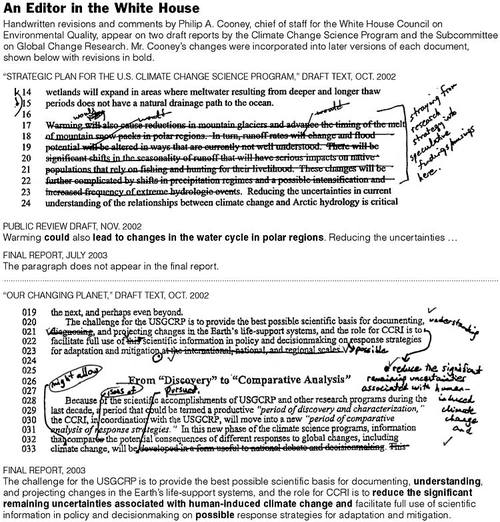That’s a line from one of my favorite movies, Reds. John Reed (Warren Beatty) is arguing with his Russian communist superiors how the speeches he ghostwrites to promote the communist cause somehow get altered when they are translated. In the movie, this marks the beginning of Reed’s dissolutionment with socialism, a cause for which he championed his whole adult life.
Well, propagandistic re-writing is as alive and well now here in 21st century America as it was in early 20th century Russia.
Whether it’s reports on global warming, or assessments of situations in Iraq, the government officials who conduct studies and author reports find that, when the end product comes to public light, it is not what they wrote. (Click the image below to embiggen)
Today comes yet another story of re-writes, this time pertaining to voter fraud and intimidation. The author complains:
After the 2000 Florida election debacle, Congress established a body called the Election Assistance Commission to improve voting and democracy in this country. Two years ago, the commission approached me about doing a project that would take a preliminary look at voter fraud and intimidation and make recommendations for further research on the issues.
***
In all the time we were doing our research and drafting the report, neither the staff nor the commissioners, who were continually advised of our activities and the substance of our work, raised any concerns about the direction we were going or the research findings.
Yet, after sitting on the draft for six months, the EAC publicly released a report — citing it as based on work by me and my co-author — that completely stood our own work on its head.
Some examples?
Consider the title. Whereas the commission is mandated by law to study voter fraud and intimidation, this new report was titled simply "Election Crimes" and excluded a wide range of serious offenses that harm the system and suppress voting but are not currently crimes under the U.S. criminal code.
We said that our preliminary research found widespread agreement among administrators, academics and election experts from all points on the political spectrum that allegations of fraud through voter impersonation at polling places were greatly exaggerated. We noted that this position was supported by existing research and an analysis of several years of news articles. The commission chose instead to state that the issue was a matter of considerable debate.
We also raised questions about the way the Justice Department was handling complaints of fraud and intimidation. The commission excised all references to the department that might be construed as critical — or that Justice officials later took issue with.
She goes on, but you get the idea. It’s very alarming that scientists’ and researchers’ work is being filtered and — literally — censored at the hands of partisan policymakers. Apparently, truth is dangerous to this Administration.

